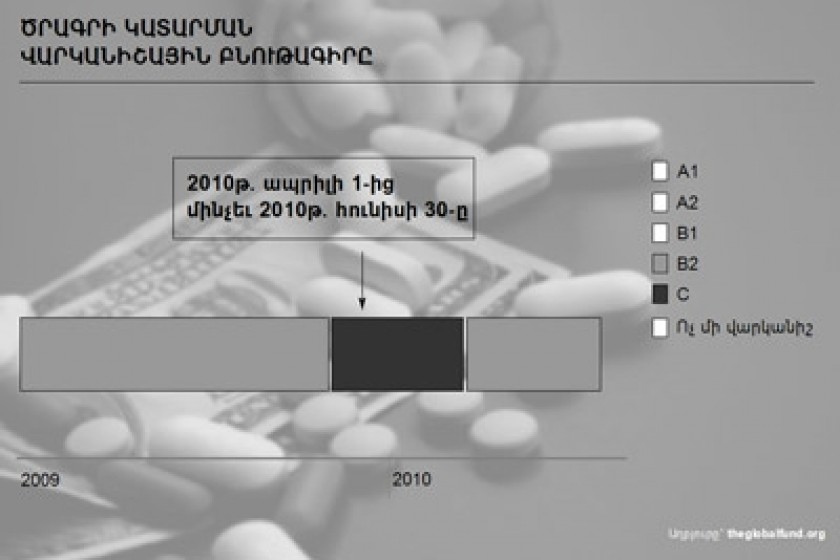
Tuberculosis Program Mismanaged in Armenia
Edik Baghdasaryan
Kristine Aghalaryan
Global Fund Cuts Grant by 68%
Medicines costing $150,000 to treat tuberculosis in Armenia have been allowed to exceed their expiration date.
These costly drugs were intended for drug resistant tuberculosis patients. Armenia received the medicine after undergoing a complicated process and at a huge discount granted by the “Green Light” committee of the World Health Organization. It is one of the component parts of the Global Fund program.
A Hetq source within the RA Ministry of Health reports that steps have been taken to cover up the fact that the medicines’ expiration date has lapsed. Officials are afraid of the scandal if news of the blunder were to leak out. The Ministry has so far failed to get back to us about the matter.
Hetq has already run a few articles on the Global Fund program. In her first interview with Hetq, Ms. Sandra Irbe, the Global Fund’s Program Officer for Eastern Europe and Central Asia, didn’t provide complete information about the program. Furthermore, she concealed certain facts and it was only due to our perseverance that she began to open up, presenting us with documents and letters. After reading through these documents and speaking with various organizations in Armenia active in the tuberculosis field, it turns out that in 2010 Armenia was deprived of some $500,000 in grant money due to flawed program management.
The Global Fund gave Armenia a ranking of “C” for the implementation, under the aegis of the Health Ministry, of the Round 8 tuberculosis program in Armenia during the months of April to May of 2010
This is the lowest score on the Fund’s evaluation index and signifies that the program was implemented at a 0-30% efficiency level. Given this low score, the Fund decided to cut funds to Armenia for the 5th and 6th quarters by 68%. Thus, instead of getting 471,376 Euros, Armenia only was allocated 151,818 Euros.
Let us again stress that these funds were to be used to treat those suffering from TB.
Incidents of official abuse were replete throughout the program’s implementation. Let’s just single out a few.
Armen Karapetyan, Director of the Health Ministry’s Department of Finance, received a salary from this program for 18 months. As a civil servant, he had no legal right to such wages.
Even Sandra Irbe raised this infraction in several of her letters. Later on, for some inexplicable reason, she dropped the matter. During her interview with Hetq, Ms. Irbe places the bulk of the blame for the failure of the program squarely on the shoulders of Vahan Poghosyan. Last November, Poghosyan was appointed temporary Acting Chief of Staff at the Ministry and is presently serving as a presidential advisor. For some strange reason, Ms. Irbe also includes Sergei Khachatryan, the newly appointed Deputy Health Minister, in the guilty list.
At the time, however, the program was being managed by former Deputy Minister Abraham Manukyan. Vahan Poghosyan was no longer involved in the program after June, 2010.
Armenia received the lowly score of “C” afterwards, when Ovsanna Najaryan was heading the coordinating committee for programs in Armenia. She’s still employed at the same post and receives a monthly salary of 1.2 million AMD. Despite getting paid such a high salary, programs under her watch continue not to make the grade. Nothing has changed during the past three months.
We have a letter in our possession written by Sandra Irbe to Health Minister Kushkyan. In it, the Global Fund official writes, “You have until March 20, 2010 to resolve all existing shortcomings in the program.” But even Ms. Irbe has quickly forgotten about her warnings.
There are a number of factors why the TB program has failed in Armenia and received such a low score.
If the existing infractions and faults aren’t quickly resolved, the entire program’s continuity may be jeopardized.
This would mean that Armenian citizens, TB patients, would suffer due to government negligence and mediocrity.
Naturally, in Armenia, the officials responsible for such failings are never held accountable.
 Videos
Videos Photos
Photos




Write a comment